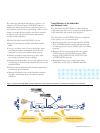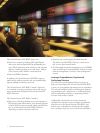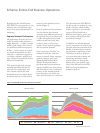
Optimize Wireless Networks for Data2
End users around the world are quickly adopting the
blended lifestyle made possible by accessible and afford-
able communications that allow them to blur the lines
between work, home life and entertainment. To support
that lifestyle, end users are subscribing to services they
can easily adapt and personalize to their needs on
whatever communications device they choose.
Wireless broadband data services are an important part
of the blended lifestyle equation. They allow end users
to not only place calls and access the Internet with
their wireless devices, but also connect with their office
networks over secure links, download music and videos,
and take advantage of a host of location-based services
that give them access to home, work and entertainment
from anywhere and at any time.
Fueling this evolution in communication are new
IP-enabled cell phones and laptop air cards that,
when combined with new data pricing plans, have
made using wireless broadband data services more
affordable. As a result, wireless service providers
worldwide are beginning to experience measurable
subscriber uptake for these services. The wireless IP
transformation is here and now.
But while all this is good news from a business perspec-
tive, the increase in data traffic is creating concerns about
how IP packet data affects wireless networks. Since IP
applications were not designed for transmission over a
wireless infrastructure, it is no surprise that some of these
applications consume significant amounts of resources
in the wireless network. In addition to bandwidth, these
applications consume signaling, radio frequency (RF)
channels, airtime, and backhaul resources. The perform-
ance of wireless IP networks is intimately coupled to the
types of applications the network transports, and in a
complex way.
To accommodate the IP load, and enable resilient and robust
delivery of emerging applications, wireless service providers
need complete visibility of how every behavior and flow —
resolved to individual devices and servers — places load
on the network. This is a paradigm shift in how IP networks
are currently built. This new visibility means the service
provider can effectively optimize their wireless networks
to deliver the continuously evolving list of applications.
Identify Resource Usage
and Manage the Network
The Alcatel-Lucent 9900 Wireless Network Guardian
(WNG) offers powerful capabilities for monitoring
2.5G, 3G and 4G wireless data networks. It identifies
wireless network resource usage and allows you to better
manage network performance. And it allows you to pro-
tect your networks from degraded performance and outages
that can arise from transmitting wireless-unfriendly IP
traffic.
This advanced wireless network monitoring product
provides detailed information about how every subscriber,
application, server, and flow creates actual load on your
wireless data network, and delivers alerts about any
behaviors that have an anomalous impact on network
performance and capacity.
“There is no shortage of tools on the market that provide traffic analysis for wireless
operators. Much less common, however, are tools that go beyond simply identifying
traffic types or usage and provide visibility into the impact of that traffic on network
performance. Most people believe that going forward — as 3G takes hold and 4G
gets launched — nobody can predict which applications will drive mobile broadband
uptake. If so, tools such as Alcatel-Lucent’s 9900 WNG will be critical for ensuring
that operators can not only head off network threats but also incent applications that
make the most efficient use of network resources."
P E T E R J A R I C H , R E S E A R C H D I R E C T O R , C U R R E N T A N A L Y S I S
Enabling the Wireless IP Transformation










